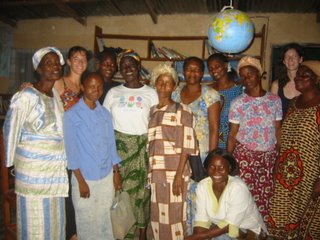HIV/AIDS Outreach
CBW has instituted an HIV/AIDS outreach program, which many of you, having read about the astronomical HIV rates in Africa, may think is totally fitting endeavor. And it is a needed program. However, you may be surprised to learn that West Africa, for whatever reason, has been able to contain the rates of HIV infection. While areas of Botswana (in East Africa) have infection rates of over 40%, Ghana has a rate hovering around 3%. And even this rate has dropped slightly in recent years. In fact, my home city, Washington D.C., has even higher rates than Ghana!
That said, I am living in “little Liberia”, not Ghana, so the infection rates could be higher here in this insulated community where sex is an easy cure for the pervasive boredom. The thing is, nobody knows. There are simply no good statistics because people are afraid to get tested – understandably since there’s no cure and plenty of stigma. But in the few months since I first arrived, my close circle of acquaintances has suffered at least 2 deaths to AIDS. And a local doctor told me that about 1 or 2 in every 10 people who submit to testing have positive results. That high rate could be the result of a selection bias (only those who already suspect they may have contracted the virus get tested), but we just don’t know. The rates could be high and the stigma is certainly there, so the local and international volunteers feel more than justified going out daily to educate the community about the virus.
So, that’s what they do. The HIV team sets out donned in red smocks that announce “HIV/AIDS team” and approach just about anyone they can find to have an unsolicited discussion about the disease. The community is surprisingly receptive to their overtures and they listen patiently and attentively to the presentation.
Those of us in the West who are inundated with information campaigns easily accessed through omnipresent media sources can tend to forget how little some people know about the disease. But in a community where information is passed largely through word of mouth, rumor and misinformation can spread and amplify to the point where people believe that AIDS is spread by kissing and cured by witchdoctors.
But the upshot is that Liberians are surprisingly frank when it comes to talking about sex. The outreach demonstration is pretty graphic and at some point after a rather clinical discussion about the way in which the virus affects the immune system, the presenters incongruously whip out a large dildo and proceed not only to demonstrate how to correctly dress it with a condom, but also thrust the thing forward simulating rough sex (as it may diminish condom effectiveness). This inevitably elicits embarrassed and juvenile laughter from the international volunteers, whereas the Liberians (even the teenagers) just kind of nod knowingly and maturely. Sex here is … what’s the opposite of taboo? It’s just a part of people’s lives and something everyone accepts with a kind of frankness that that would make some of the more libertine hippies at home blush.
That’s not to say that people here are more promiscuous, but just that there is not all the religious and moral baggage that we usually tote around with sex. Maybe this frankness is out of necessity. I mean, people share very close sleeping quarters and are inevitably exposed to other people’s sexual activity. I guess it doesn’t really matter why, but it does make these outreach discussions more lively and honest. By comparison, I can’t begin to image how difficult it would be to have these candid discussions in a Muslim country.
So the outreach has been productive in generating discussion at least. But it’s hard to say how much effect these teams are having. A band of strangers, included among them some young white faces, may not carry the same force of legitimacy as a trusted friend or pastor, and it’s not easy to determine if these discussions are actually changing anyone’s behavior. And the presentations do leave a little to be desired. They spend an inordinate amount of time discussing how to properly store a condom (not in your back pocket or in the ceiling rafters) and how to open it (not with your teeth and always along the perforation) and absolutely no time talking about how to convince your partner to put the thing on in the first place.
International volunteers, especially those with the advantage of a health background, generally want to enhance these presentations, but the language and cultural barrier often hamper these efforts, and the foreign do-gooders are left feeling frustrated or simply superfluous working with the outreach team. At least that was the case until a few weeks ago.
Unbeknownst to us, one of the Liberian volunteers has been doing a lot more than spreading the gospel of HIV prevention. Victoria has been spending several hours a day visiting those people who had already contracted the disease. This was all done clandestinely to prevent any possibility of revealing the identity of AIDS sufferers. Vic would come by their homes to simply check in or provide a shoulder to lean on and even some food and medicine when she could. She had been making a silent but immeasurable impact on people’s lives. We would have known nothing about this if she hadn’t invited Mark (one of the international volunteers) to join her on one of her visits.
Mark went to visit a man called Taller (due to his height) and his 4-year old son we all affectionately came to call “Small Taller.” Taller, already in exile from Liberia, had been thrown out of the community due to his HIV positive status and was living in the bush outside camp completely cut off from his support network (a refugee from a refugee camp). He did at one time have a wife and neighbors and friends, but all of that was gone along with any means to support him and his tiny son.
His shelter, though you could hardly call it that as it lacking the very defining characteristic of shelter - a roof, was falling apart and he had virtually no personal possessions. On top of this reversal of fortunate and this indignity, Taller was sick and his son had probably contracted the disease as well – though Taller refused to get him tested because the any negative news would have devastated him to the point of taking his own life and leaving Small Taller an orphan.
So, Victoria thought that maybe a visit from the outside world might help Taller and encouraged Mark, an international volunteer from Ireland, to pay him a visit. Mark was shaken and moved, touched and outraged by what he saw. He quickly moved to raise funds so that Taller could build a roof and provide better care for his son. He has even begun a fund to bring anti-retroviral therapy to some of Victoria’s clients.
Conditions on the camp are hardly stellar, but the strength of the community seems to overpower and at times even help alleviate any material deprivation. Taller was stripped of all of that and forced to live in isolation with no means to support himself. As volunteer coordinator, I worried that visits from a short term international visitor would do more harm than good when that support was once again yanked away from Taller, but I was wrong. At Mark’s leaving ceremony – each group of departing volunteers is thanked in a public ceremony full of speeches and gifts – Victoria read aloud a letter from Taller that went something like this:
“Mark, you and Victoria have saved my life. I had started to lose my faith in God. It seemed he had abandoned me and there was no hope for myself or my son. But then you came to visit me and showed me that people do care about each other and that god acts through you. You have given me hope back and let me live again.”
Of course, it was much more beautifully rendered than that, and many people were moved to tears. These leaving ceremonies can be full of embellished and ceremonial gratitude, but this was the one moment that seemed to crystallize the positive aspect of our presence here. Sometimes it’s just important to let people know that there are people from the outside who care enough based on some shared sense of humanity. Victoria, Mark and Taller all helped to remind me of that.









